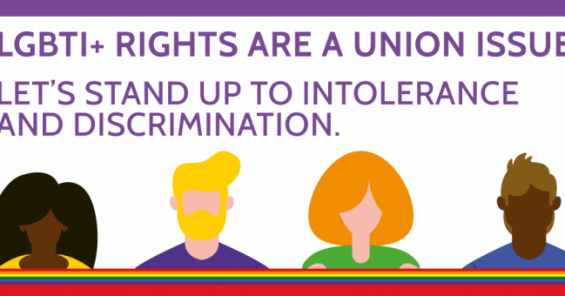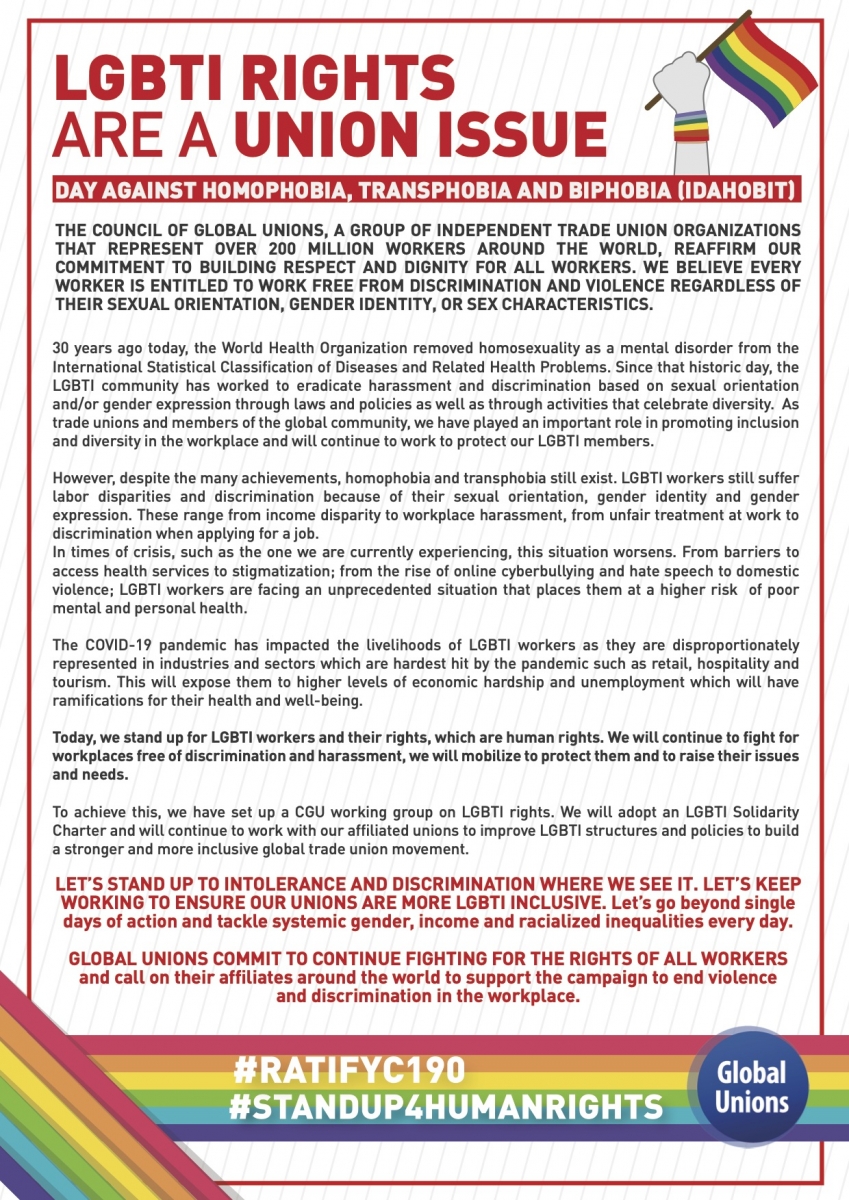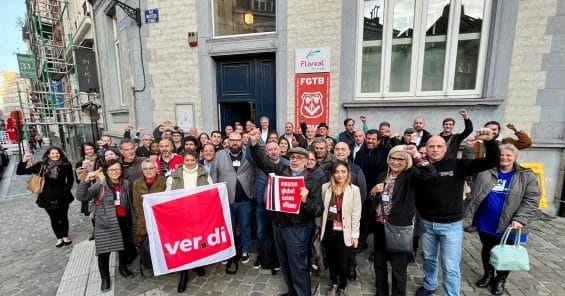This 17 May, UNI Global Union is marking the International Day against Homophobia, Transphobia and Biphobia by taking action to protect LGBTI+ workers, as the coronavirus crisis is hitting these workers particularly hard.
UNI is joining other global unions and the ITUC in issuing a statement reaffirming its commitment to building respect and dignity for all workers and is closely coordinating with these organizations to develop a “Solidarity Charter” to build a more inclusive trade union movement.
UNI has also updated its LGBTI+ guide for trade unions and UNI Equal Opportunities has re-launched its “I belong to my union” drive. The campaign aims to raise awareness about discrimination faced by LGBTI+ workers globally and explain how trade unions are essential in the promotion of decent work, free from any form of discrimination.
“Unions globally have a long history of pushing for LGBTI+ rights, and this crisis has created new challenges and shows us how much more work we have to do,” said Christy Hoffman, General Secretary of UNI Global Union. “We are committed to coming out of this crisis with a fairer, more just economy for everyone, and that clearly means redoubling efforts to advancing LGBTI+ rights.”
In times of crisis, such as the one we are currently experiencing, this situation worsens. The COVID-19 pandemic has created additional issues for LGBTI+ workers such as:
- Economic and jobsite discrimination: The bias that LGBTI+ workers face in the world of work—including income disparity, workplace harassment, discrimination when applying for a job, and other unfair treatment—has been exacerbated by the pandemic. LGBTI+ workers already had an unemployment rate higher than the general population, and the Covid-19 crisis has impacted the livelihoods of LGBTI+ workers as they are disproportionately represented in industries and sectors which are hardest hit by the pandemic such as retail and creative industries.
- Access to Health Services: LGBTI+ people regularly experience stigma and discrimination while seeking health services, leading to disparities in access, quality and availability of healthcare. In countries where laws criminalize same sex relations or target trans persons due to their gender identity or expression, the negative health outcomes are exacerbated as LGBTI+ workers may not access healthcare services for fear of arrest or violence.
- De-prioritization of required health services: Given overloaded health systems, treatment of LGBTI+ people may be interrupted or deprioritized, including HIV treatment and testing, hormonal treatment and gender affirming treatments for trans people.
- Stigmatization, discrimination, cyberbullying, hate speech and attacks on the LGBTI+ community: LGBTI+ people have previously been blamed for disasters, both manmade and natural, and the UN reports that this is happening in the context of the COVID-19 pandemic, with an increase in homophobic and transphobic rhetoric.
- Domestic violence and abuse: Due to stay-at-home restrictions, many LGBTI+ youth are confined in hostile environments with unsupportive family members or co-habitants. This can increase their exposure to violence, as well as their anxiety and depression.
“As unions, we need to continue to raise our voices against all forms of discrimination and reaffirm our commitment to protecting all workers and their rights. It is our job to do everything in our power to ensure social justice, equality and protection for all. Let’s make it happen!” said Veronica Fernandez Mendez, Head of UNI Equal Opportunities.
In response, UNI has issued guidelines for trade unions to help LGBTI+ workers during the pandemic, as well as information that unions can use to circulate amongst their members listing institutional resources to protect workers in need.
In 2018, at the UNI World Congress in Liverpool, UNI pledged to continue to include LGBTI+ issues in its work against discrimination, and this 17 May UNI will take new steps in this direction.
Thirty years ago, on 17 May 1990, the World Health Organization (WHO) removed homosexuality as a mental disorder from the International Classification of Diseases. Since then , the LGBTI+ community has continued to work to eradicate harassment and discrimination based on sexual orientation and/or gender expression in all aspects of life. The fight is long from over as 72 countries and territories still criminalize same sex relations between consenting adults and only 63 countries provide some form of anti-discrimination protection for LGBTI+ people.
For more information and materials please visit http://en.breakingthecircle.org/



